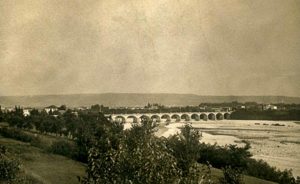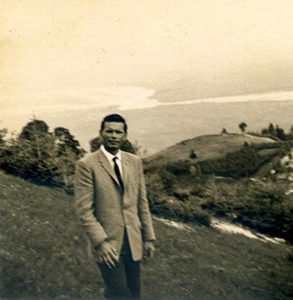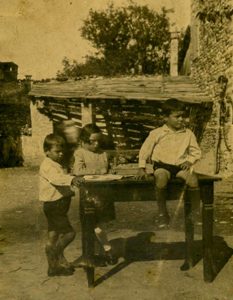On these pages you will read the reflections of the descendants of the pioneer families.
My grandfather’s journey
Monday, April 12, 2010

My grandfather Bruno Rebuli was a quiet man, of “regular” height with brown hair and blue eyes. He was also known for his hard work and strength. What made him want to find a new life for his young family in such a far away land as Australia can only now be left to conjecture. My father often said that my grandfather was uncomfortable with the political climate in Europe at the time. Hardly surprising due to fact he personally witnessed the brutal impact of World War I on the Bigolino area. Rumours of another world war looming must have been the only incentive my grandfather needed. With a brother-in-law already established in Adelaide, South Australia, my grandfather, aged 33, left his family behind and made his way to the Italian seaport city of Genoa to board the 5,359 ton vessel called the Carignano headed for Australia.
Ship records for the Carignano show that the majority of the 123 passengers were men. None of them could speak English and I am sure they new very little about the new country they were travelling to. One can only imagine what was going through their minds as they said goodbye to their birthplace, parents and siblings knowing very well that they probably would never see them again. What were they thinking during the long sea journey and as they first saw what would be their new home? It is a sad fact that a large proportion of men that migrated from Italy to Australia during that era all died young. Could it be because of the extreme stresses and difficult conditions they endured to create a home for their families? There can be no doubting that the sacrifices and hardships they must have faced would have been enormous. However, I do not recall ever hearing anything about my grandfather complaining or making an issue of it. I am sure he simply saw it as something he needed to do for the wellbeing of his family.
Sum of 16 pounds on his person.
It shows the arrival date of the 25th of July, 1927 at Fremantle with his intended address to be c/o (brother-in-law) Rossetto, Domenico, JP Cape Spencer, SA and also lists a Costa, Romano, residing at 32 North Street, Adelaide, as an acquaintance. The papers say his intended occupation in Australia was to be a farm labourer. I have heard that he spent some time working on Kangaroo Island – sometimes for several weeks at time – clearing scrubland and other claims that he (quote) “worked in the outback with camels”. Adelaide in the late 1920’s was only a small city and the outback probably was not that far out of suburbia. However, I have also heard of camel trains that transported Mica from Alice Spring mines to Adelaide and perhaps that is to what they are referring.
It would be four years before his wife and three children would join him.
2010
It is New Years Eve 2009. A good time for reflection on times and people that have touched our lives. And to look forward to fulfilling ambitions in the future. It is incredible to think that we are about to start the year 2010. I remember thinking as a child that talking about reaching the year 2000 sounded almost amazing but for some reason being on the eve of 2010 is even more so.
As I go on with my search for information into my family history and ask “where to now?” the beginning of a new year will undoubtedly bring more pieces to add. However, for now, let us all enjoy the festivities and the anticipation of a fresh start.
The Rebuli’s of Bigolino
My grandfather Bruno (Brunone) Rebuli was born on the 23rd of October, 1893 in the small town o

Bigolino in Northern Italy. He was the middle son of Bortolo and Dori Rebuli and had two surviving brothers – Giovanni, the eldest, and Silvio, the youngest – and one sister, Maria. Two other brothers died at an early age. One drowned in a water hole on the family property when just a toddler and the other perished in Russia during World War I. I only just recently became aware that my grandfather’s name was in fact Brunone after a search uncovered his entry papers when he first arrived in Australia. Before that, I had only ever heard him referred to as to Bruno.
Bigolino is east from the city of Venice in the Veneto region and next to the bigger and better known town of Valdobiaddene in the province of Treviso. It is a pretty area, situated just next to the River Piave and mostly dominated by grapevines and other agricultural activities. The Rebuli family were farm people who owned their own land situated at Via Boschi. On all accounts, they had a comfortable existence growing mostly grapes but also a few other smaller crops that included wheat and corn. They also had an ox, mule and cart which they used for work they did for the local “commune” (council) gathering rocks from the banks of the Piave and maintaining the local roads.
The River Piave begins in the Italian Alps and flows southeast for 220km into the Adriatic Sea near Venice. It has seen several battles including in 1809 during the Napoleonic Wars in which Franco-Italian and Austrian forces clashed. In October, 1918, it was the decisive Battle of Piave on the Italian front. The failed Austro-Hungarian attack cost them nearly 200,000 casualties. The Piave has since been labelled the Sacred River of the Homeland (Fiume Sacro alla Patria).
The area around Bigolino suffered during the First World War due to its proximity to the River Piave. For some time during the war, they became cut off from the rest of Italy and were forced to struggle for just the bare necessities while the Italy on just the “other side” enjoyed a very comfortable lifestyle. As a result, many had to flee their homes and go to live on the other side of the Piave as refugees.
The fighting along the Piave during World War I was made famous by Ernest Hemmingway who spent some time there during the war as an ambulance driver. His novel “A farewell to arms” recounts his time spent there.
Today, the Piave is no longer the mighty river it once was during the battle in World War I. Often, in summer it is just a trickle of water running through a mostly dry gravel riverbed. The Piave’s upper valley has major hydroelectric stations while downstream its waters are used for irrigation. I have fond memories of swimming and playing in the low waters of the Piave as a young child when we spent some time in Italy during the northern hemisphere’s summer of 1975.
Remembering 12th of November, 2007
Alzheimer’s is such a cruel disease. I cannot deny that all diseases have their own set of horrible elements to contend with but Alzheimer’s is horrible because it steals the identity of the person afflicted with it. To watch someone deteriorate from a vibrant individual to someone who is losing “themself” is heart-breaking.

My father lived with Alzheimer’s for a number of years before he suddenly literally deteriorated over just one weekend. Up to that point he managed to cope relatively well with most things but looking back now I know how much of the fear he must have kept to himself. I can only imagine how terrifying it must be to feel your sense of control slowly slipping away from you and how brave he was to go through what he did with so little complaining. Maybe he felt by not talking about it would make it not real? That is, until he got to the stage that he could no longer – or was unable – to talk about it. After that horrible weekend, the downward spiral was somewhat quick and he was bed bound within a year. Nevertheless, throughout the entire time, the one and only thing he ever desired was to be with his family. He had a smile that would brighten up the room every time he saw me.
One thing that became overwhelmingly obvious throughout Dad’s illness is the almost non-existent support for the elderly in the community and how little understanding of what Alzheimer’s really is. I must admit I was guilty of that too before Dad got sick. There is too much of an expectation that once someone is over a certain age, the only alternative is to shove them away into a nursing home. Why is that? Is that what we all have to look forward to? To be forced into giving up our home, families, partners – our lives – just because we have gone past our “used-by” dates? Our youth obsessed culture is far to quick to abandon the elderly relegating them to “silly old bugga “ status and often they are unfortunate to become dependant on institutions or carers that see them as nothing more than “a job”, or even worse, as an inconvenience. Where is the justice in all of this? In one-way Dad was fortunate that he had us to be his voice and fight for his needs. What about all those out there that have no one? Who stands up for them?
Dad stayed with us at home – his own home – right up to the end. It wasn’t easy but we would gladly have continued no matter how long that was going to be. My main challenge throughout the entire time we were caring for Dad was to try to give him a sense of worth and dignity. The little bit of so-called assistance we got was really no more that just talk. Unfortunately, the time for counseling quickly passes and the need for real support and real action is there every single minute of every single day. However, we quickly hit brick walls whenever we tried looking for it. I guess the point I am trying to make is that Alzheimer’s is not going away. In fact, it is a quickly growing social issue. Society is aging yet so little is being done for that much valued part of the community. Sure, we hear about developments on Alzheimer’s research every day and – do not get me wrong – I think that’s great. Please, let us have more. But what we also need is a greater support system for all the elderly so they can continue living their life as long as possible with real worth. Not just talk but actions. And thirdly, a change in society’s attitudes so that the elderly continue to feel valued and respected. With that comes a greater understanding of the elderly, what challenges they have to face and what Alzheimer’s really is so that they are no longer seen as dittery, silly and a nuisance. In reality, greater care for the elderly of today is making sure we will be properly taken care of in the future. After all, god willing, we will all be elderly one day.
My dear Dad – frail and tired – gave up his battle on this day, two years ago.
What’s in a name …
It’s down to basics and the first step is establishing some sort of background to the four family names that have come together to form my “roots”- Rebuli, Rossetto, Danieli and Garbuio. Out of the four, it only stands to reason that the Rebuli name would be the easiest. After all, there are only a small number of us Rebuli’s in Australia – all of whom are related. Everyone that hears the name for the first time comments about what an “usual name” it is. So surely it should be easy enough to find out more about the name? Or so I thought.
The world really has become much smaller due to the magic of the internet and as a result I have realised just how very little I really do know. The Rebuli name is much more widespread and popular than I originally thought. I have since been surprised to discover others with the same name all over the world. I have come across the Rebuli surname in places as varied as Canada, US, South Africa, Argentina, Brazil, UK, Slovenia and of course Italy. I have even found other Rebuli’s in Australia of which I am unable to connect to known relatives. There is some sort of weird connection to a VW kombi as well as a “Rebuli” bus line in Guatemala. But perhaps the most interesting connection is to a medieval Pope of Portuguese origin with the Rebuli name. Pope John XXI (1276-77) – the first Portuguese Pope (Pietro Rebuli-Giuliani).
History shows Pope John XXI was a doctor. Rebuli Giuliani – named Pedro – was born around 1215 in Lisbon, Portugal. He studied medicine at the University of Montpellier and from 1247 was professor of medicine and ophthalmology at the University of Siena. Pietro (or Pedro, or Peter) practiced for more than twelve years and in that time he wrote several treatises on medicine and abstracts on Logistics. He had a great interest in science and astronomy and died as a result of injuries incurred when his observatory collapsed.
Missing pieces

I don’t know a great deal about the Rebuli side of the family. In fact, I know very little about my grandfather – my dad’s father. This saddens me and to date all efforts I have made to find out more has led to very little new information. I am sorry that I didn’t ask my dad more questions when I had the chance but the truth is, I don’t think he could have added a great deal extra considering he was only a very small child of 3 years when my grandfather left to start a new life for his family in Australia. And then, dad was only 7 years old when he himself left with my grandmother, his sister Dorina (8 years old) and brother Elvio (6 years old) to finally meet up with his father. Another brother – Guido – would be born in Adelaide, Australia in 1938. The memories of Bigolino – a small town in the Veneto foothills situated next to the River Piave and famous for the sparkling white wine called Prosecco – would have been very foggy indeed. Perhaps I should have asked more questions of my grandmother but she passed away in 1977 when I was only 12 years old and too young to really understand the significance of knowing one’s family history. I am so sorry that I know so little of my grandfather, Bruno Rebuli, his parents and family. But I will document the little that I do know as I continue my search and perhaps something more will come to light in the future.
What am I doing?
We all have within us a desire to know who we are. And for many of us, we reach a point in our lives when we start to wonder why our life have taken the path it has. I am not even going to start to pretend that I am going to attempt to answer that question. However, I do feel that I owe it to my family to at least document what I know about those who have shaped my journey to where I am today. It is in no way a story about me but my small tribute to them – my grandparents, my parents and others along the way. I guess it is my way of making sure that they can live just a little bit longer even if I am the only one that will ever read the words about these very special people. Not special because they achieved any degree of fame during their lives but special to me because they are my family.
Editor’s note: We are grateful to Elena granting us permission to add this blog to our website. The hyperlinks in this page were added to be consistent with other pages on this site. The image was also added.